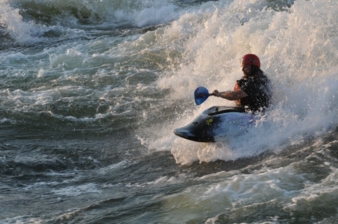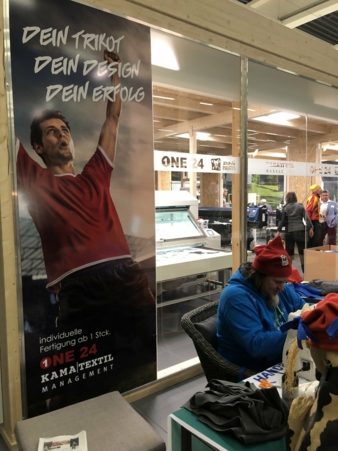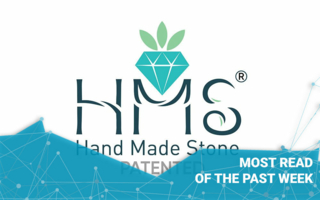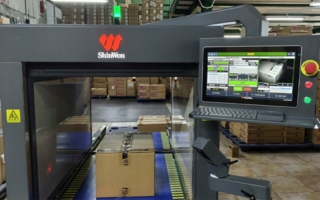19/04/2018 – Textile printing part 2 — auf Deutsch lesen
Schorschi Schauf and Young Pirates
In extreme canoeing circles, Georg “Schorschi” Schauf is nothing short of a legend. ...
The extreme and expedition kayaker also became something of a celebrity after “bossing” the hazardous Rhine Falls, back in 1997 and 2003. Embarking upon a new adventure with his company “Young Pirates” and partner Kama-Sport, he has now set out to conquer the textile market. A sense of adventure coupled with pragmatism perhaps best describes this latest undertaking. It’s all about passion, ingenuity, inspiration, innovation combined with state-of-the-art online shopping concepts, textile technologies and the perfect application of digitalisation.
The twin-bobbled hats
It all started in the tactile world and in nature – or to be more precise in a camper van. This is where “Schorschi”, as his friends call him, would sew his now legendary, twin-bobbled hats for his paddling mates at the Rodeo Events in return for supplies. His success coupled with his knowledge of what kayak and outdoor sportspeople demand of their apparel and equipment, gave rise to a business idea: to create the Young Pirates label and produce German-made functional apparel specifically for kayakers and water-sports enthusiasts – innovatively, resource-efficiently and from a functional material designed specifically for the purpose. “Sports men and women working in the unforgiving element of water need to be able to place their trust in their equipment. This is what prompted Young Pirates to launch high-quality, unique products for the outdoor clothing market,” says Schorschi Schauf.
The manufacturing process
Each item is produced individually and is thus a unique piece tailored to the requirements of each sports person. The chosen design is printed directly onto special sublimation paper. The sublimation ink produces high-quality printing results with brilliant colours in photographic quality. The sublimation inks do not contain any binders or solvents, they are water-based and certified with the Oeko-Tex Eco Passport. Without damaging the textile fibres, the printed image is steamed into the fabric at 190 degrees, making it wash-resistant. This process eradicates the need for washes otherwise required for dyeing. This, in turn, helps to conserve environmental resources (water). After calendering, the printed fabric and waste paper are all that remains. The printed fabric is sent to the laser and the waste paper is recycled. The fabric remnants from the laser cutting process are shredded, upcycled and used as stuffing for seat cushions. The cutting image is recorded on camera and is precision cut with a laser. This allows unique cuts to be produced quickly and simply without the need for data management.
The production and execution of the Young Pirates collection takes place in Kassel for qualitative and ecological reasons. Partner company Kama-Sport had a complete production line installed as a “microfactory” at the end of 2017. This investment has allowed Kama-Sport to expand from retailer to manufacturer. Talking to textile network, company owner Holger Gartz, stated: “For the sake of the environment, jersey production should really only use sublimation technology and take place close to market.”
The equipment
The technical equipment for the microfactory in Kassel is accommodated in an air-conditioned room and comprises textile printing software (Ergosoft), a digital printer with sublimation inks (Mimaki TS300P), a calender also equipped for elastic goods (Heatjet Evo4 Table), and a laser with optical image recognition (CCT). The digitalised production line was supplied by Multiplot from Bad Emstal. In an interview with textile network, Managing Director Joe Rees stated: “The concept of having a sewing shop next door with six seamstresses has great potential. It opens the door to individual designs, quick delivery, and production close to market. What I find so exciting is that the company only produces what has actually been ordered.” The concept behind the microfactory was developed in collaboration with the Institute of Textile and Fiber Research (DITF) and represents a stepping stone on the path to digitalisation and industry 4.0. The ability to have an idea and to create a microfactory that is ready for production within just a few months paves the way for SMEs to install their own production set-ups. It also enables adaptive products to be manufactured both quickly and in line with environmental standards as well as in batch sizes of one.
Customer contact through the internet
Making its online store solutions available to Young Pirates, as well as around 200 clubs and organisations, Kama-Sport is turning into an all-round supplier, right the way through to offering a complete payment process. Each operator is free to choose which brands they wish to work with (Russel, Hakro, Adidas, etc), and Kama-Sport takes care of fulfilling the entire order, from start to finish. However, Young Pirates is slightly different in that it offers its own collection, developed in cooperation with an experienced pattern maker. The collection allows each element of the textile to be coloured individually with 20 shades to choose from. To assist customers in finding the right size, they can either order a standard size or provide the measurements of one of their “favourite” garments. The cut is created in line with the measurements provided, and – for an extra charge – the garment can be made and delivered within 24 hours. “To meet the high expectations of Young Pirates, we’ve created a new fabric by the name of Kama-Tec Lotus Pro 34 which I’m really proud of,” states Schorschi Schauf. Endowed with several important attributes, the fabric is durable, water-resistant, breathable and resistant to soiling. It keeps the wearer warm and dry and does not absorb unpleasant odours.
Young Pirates lives by the maxim of quality rather than quantity!




